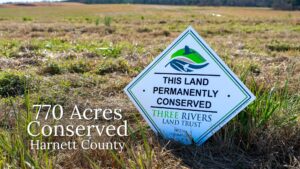
“The farmer is the only man in our economy who buys everything at retail, sells everything at wholesale, and pays the freight both ways.”
President John F. Kennedy
To say that agriculture is important in North Carolina would be an obvious understatement. Agriculture and agribusiness, including food, forestry, and fiber, is the number one industry in North Carolina, contributing $87 billion to the economy. North Carolina ranks first in the nation in farm cash receipts for tobacco and sweet potatoes; second for poultry and eggs; and third for pork and trout. North Carolina also has a diverse agricultural industry, with more than 80 different types of commodities being sold each year.
Unfortunately, the number of farms in North Carolina continues to decrease. As of 2018, there were 46,400 farms in North Carolina, which is 5,600 less than there were in 2012. These farms were operating on a combined total area of 8,400,000 acres in size in 2018. The average individual farm size is 181 acres, which is up from 168 acres in 2012. That translates to the fact that many of our smaller family farms are disappearing.
The average age of a farmer in North Carolina in 2018 is 59, and the average farm income was $57,042. Less than 13% of the principal operators of farms are female. Less than 6% identify as a race other than Caucasian. Only about half of those who identify themselves as farmers list farming as their primary occupation. Add to that the fact that only 43 percent of farms in the state recorded any net economic gains between 2007 and 2012, and it’s easy to understand why fewer and fewer young people are choosing farming as a career.
Fortunately, we do still have a lot of farming communities and successful farm families in the central Piedmont. Many of our farms have multi-generational families that all participate in the farming enterprise. Some of these farms have expanded their facilities to include nontraditional agribusinesses, such as serving as venues for weddings, and offer seasonal and school-group tours and activities.
Our state has invested more money in farmland preservation in recent years as well, through the North Carolina Agricultural Development and Farmland Preservation Trust Fund. Providing farm families with income from sale of conservation easements allows these families to continue their operations by purchasing new equipment and additional properties whereby they can expand farming activities and become more sustainable businesses.
Three Rivers Land Trust, the organization I work for, works hard to assist local farmers to both apply for grant funds to purchase conservation easements and to take on donated conservation easements, for which farmers can receive tax benefits. In our 24-year history, we have helped conserve over 13,000 acres of local farmland here in the central Piedmont.
The loss of farmers and farmland is not only detrimental to the economy of our state, but without them we would also not have fresh, safe and local food for our families. Consider supporting farmers and farmland preservation efforts in your local community today.